Benerkenswert July 2023
Welcome to the July issue of Benerkenswert!
Our life swings wildly between exciting and boring these days. Taiwan’s summer is like winter in Europe the season you would like to escape from. Alas, we’ll stay this year. But more on that maybe in a later issue.
Over the last months I took some forays into broader and fuzzy questions around German and Taiwanese society. I want to share some experiences, wonderings, and thoughts about this in a series of articles. Consider this issue a sort of narrative prelude.
Prelude: German parts in Taiwan’s engine of progress?
When I tell people I meet here that I am from Germany, I am often met with an unexpected and weird enthusiasm. Unexpected as this is definitely not the reaction I was used to in Europe (where indifference is probably the best you can hope for); weird as I grew up thinking that indifference is the best opinion about nationality, anyway.
Some of the excitement definitely comes from the welcoming kindness towards a guest. Some comes from the pride of a good host (visitors are still rare these days). Yet, walking the streets of Taipei quickly shows that there is more to it. All you have to do is to follow the German flags bedecking shops and products alike, crowned by a bold “made in Germany” sign.
Success
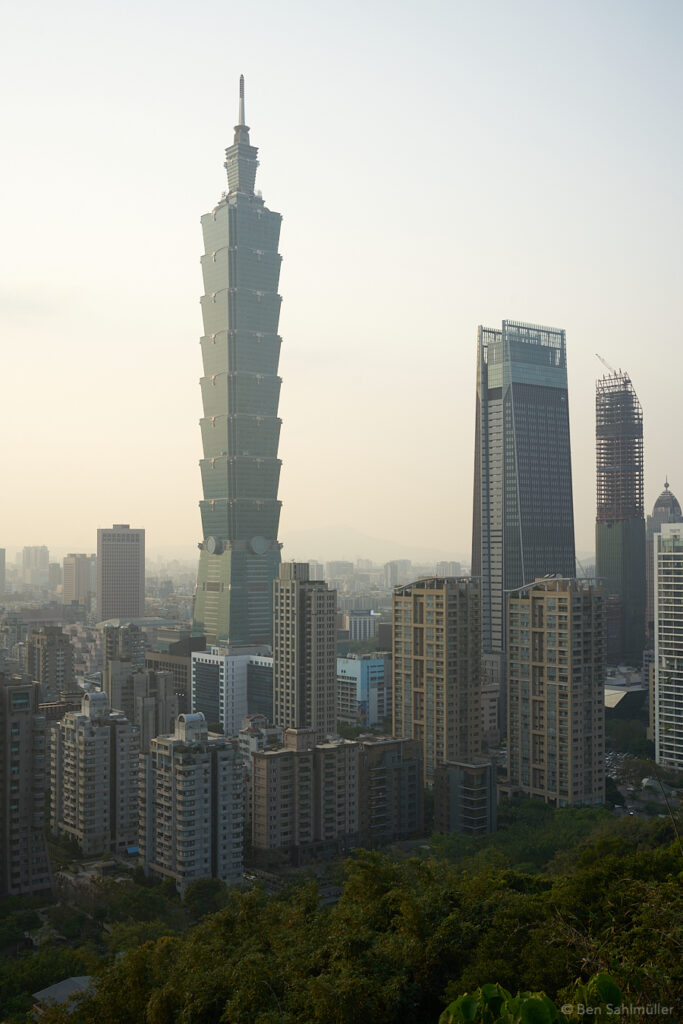
Taipei 101 is for Taipei what the Eiffel Tower is for Paris and the Statue of Liberty for New York. Finished in 2004 as the then-highest building on the planet, its opening possibly marked the high point of Taiwan’s self-determination: Four years earlier, the election of Chen as president marked the peaceful end of the reign of the Kuomintang (KMT)I wrote about the era of martial law know as the White Terror in an article on a study tour to Chiayi, a city in Taiwan’s south.; Taiwan’s investment in innovation had paid off as the country joined the developed nations on the back of its booming manufacturing industry – especially in semiconductors; and even the relationship with China was much closer under Hu Jintao than it is now.
While Taiwan’s rise is now contested stronger in both semiconductors and politics, Taipei 101 still towers over the city. Calm and monumental, not the center of power but a symbol of its pride. (The government is further West, while the economic center of power is TSMC’s headquarter). It is a landmark of the city’s new center and possibly the horcrux of the (cosmopolitan) part of the country’s soul.
Around Taipei 101 lies Taipei’s new finance and commercial district Xinyi. It features not only the offices of Merrill Lynch, Deloitte, Allianz, WeWork, and Taiwan’s Hua Nan Commercial Bank but also one of the highest density of department stores of the world. Between Apple, Ralph Laurent, and Coco Chanel, Muji, H&M, and Zara, the malls and shops could be anywhere if it weren’t for subtropical climate and the clear icons of Taiwanese culture – Mandarin letters on red surfaces, for example, or people dressed as mascots dancing to the music of street performers.For more photos and a bit of background, see these articles on Lunar New Year celebrations in 2023 or on shopping during the holiday season. That, and a sense of rush, controlled elegance, and deep fatigue where you might find hipsteresque individuality, leisure, and a certain brazenness in a city like Berlin.
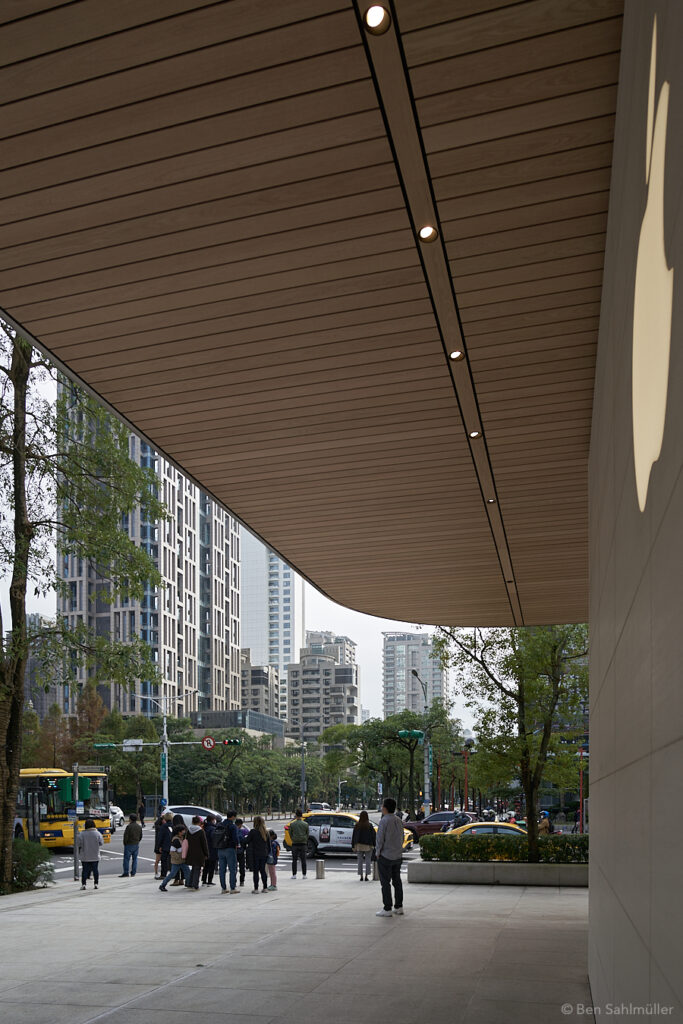
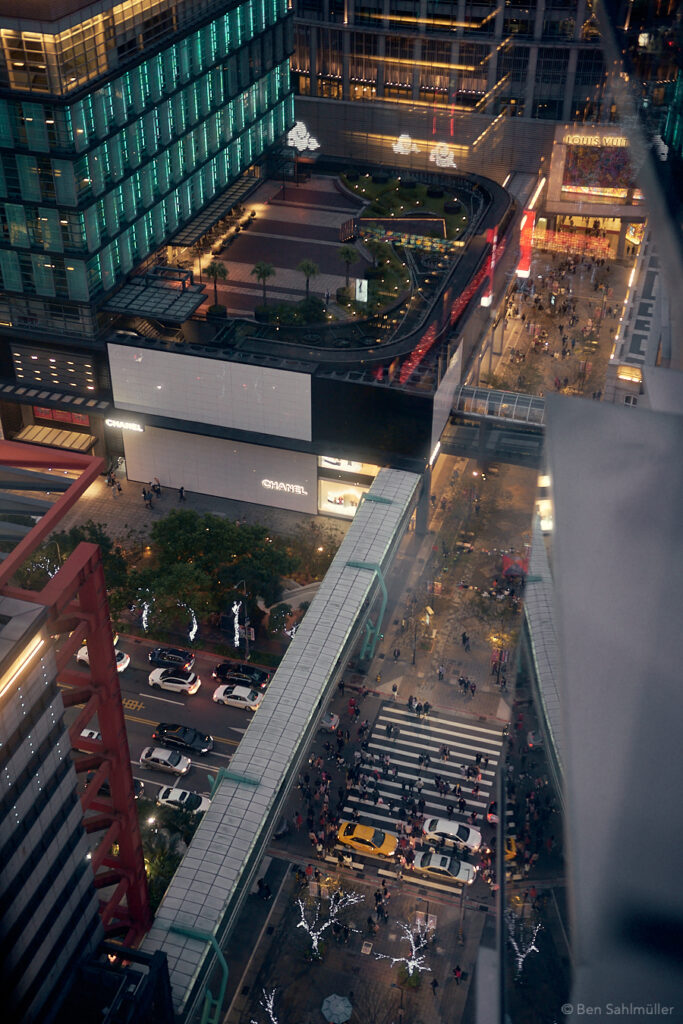

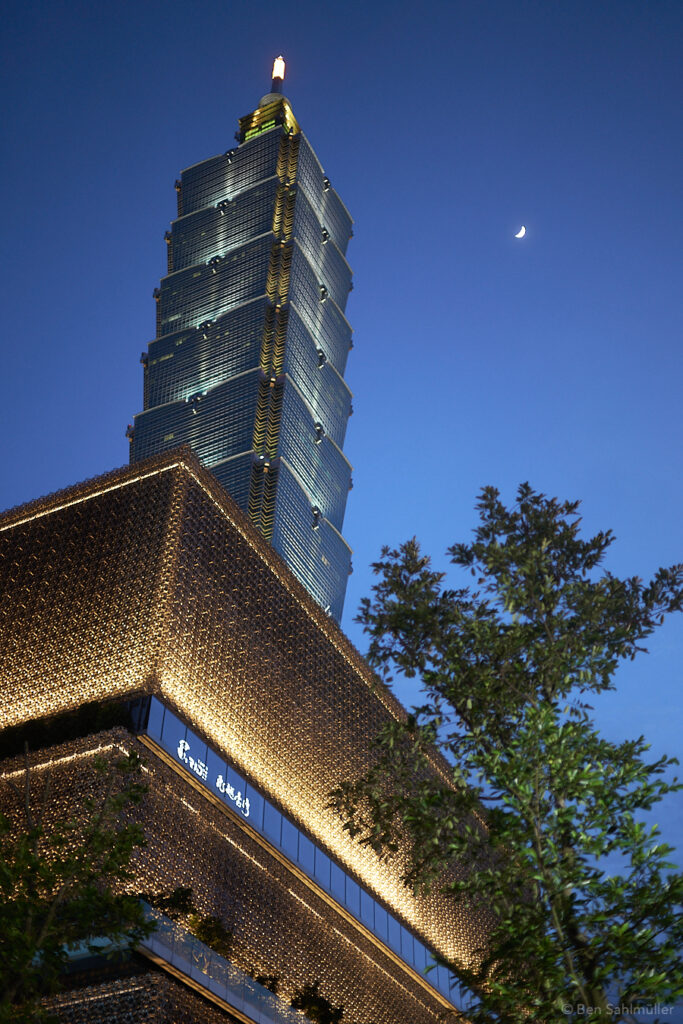
The price of success
Above the malls you find cocktail bars and high-class restaurants for the special occasion; below the ground food courts for the normal days. If 101 and the area around it symbolizes the determination and success of Taiwanese upper and upper middle class, both in ambition and reality, these food courts illustrate its price: restlessness, crowdedness, and fatigue.
Like many people working or living in the area around 101, I like to go to the courts for lunch from time to time. Taiwanese of all strands of life come here to wolf down their meals. “Eat it and beat it,” as the saying goes. Smartphones in hand, many escape the buzz around them through their screens. (“Phone eats first” tends to be the motto only in the higher-class restaurants above the malls). Around noon, you will likely see a young banker or old Taiwanese resting their head in their folded arms, taking a nap, exhausted from the morning.
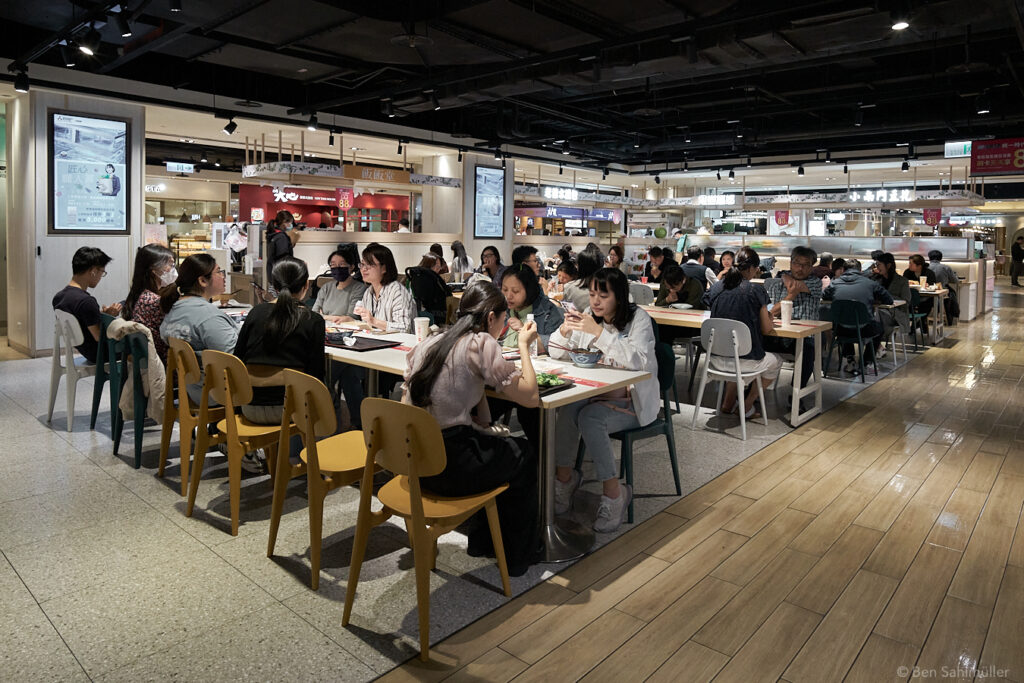
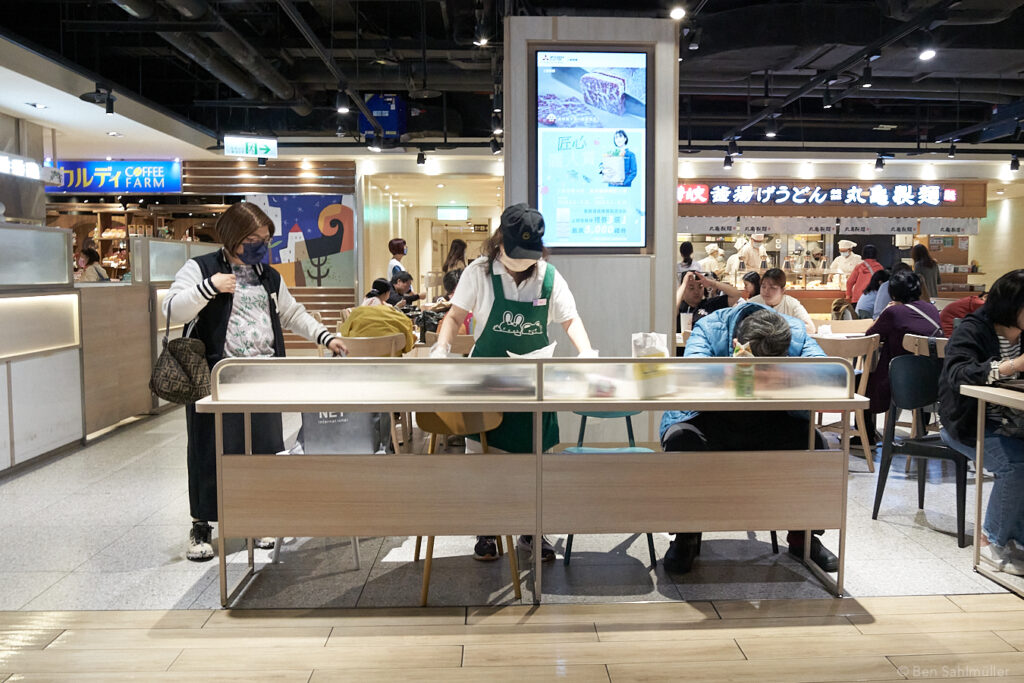
A promise
The food is sorted by kind and nationality. Taiwanese dumplings, beef noodle soup, even chicken intestines have their own stands. Next to it you find Japanese, Korean, Chinese, some Indian, even French or Italian cuisine. (The US is represented by McDonalds, of course). Notably absent from these shops are country flags, unsurprisingly absent a place to buy pretzels and German Sauerkraut.
And yet, this basement harbors an irritable mystique: A few meters down the alley from the food stands towards the exit, the bright letters “Reformhaus” and the black, red, and golden stripes of the German flag promise something else than food: A costly balance of health, naturalness, and – most of all – quality in what looks like a mixture of pharmacy and beauty salon. “Made in Germany” still caries a lot of weight in Taiwan. The quality of Porsche and Miele. And the German flag is its stamp of approval, massaged onto cars, medicine, kitchenware, and beer.
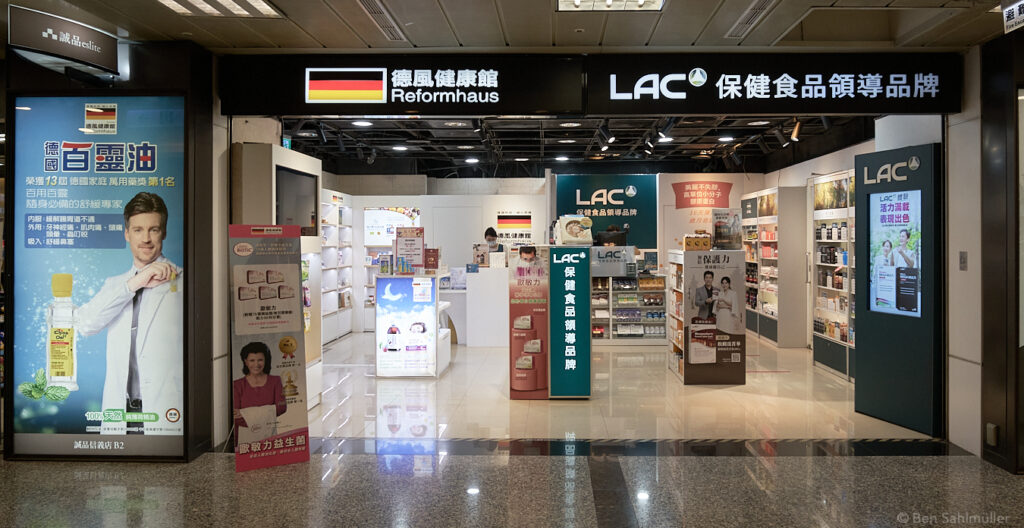
A puzzle
Of course, in a city of millions, the Reformhaus is just a random detail. (Even that there’s a whole chain behind it doesn’t change its cultural insignificance). But by being at the doorstep between progress and fatigue, by addressing this tension through a promise (of success and well-being), and by symbolizing it through a foreign national icon, it serves as a curious entry point: What is it about Germany that leans into being idolized? Why Germany of all nations, and why here in Taiwan? How much of such idolization finds its roots in German culture, how much is just branding of a few businesses? And if it’s just marketing, why are the cynicism and desperation I feel when passing by (instead of pride!) not only directed at the shop, but also the symbol itself?
What is nationality, anyway?
There are these two young fish swimming along, and they happen to meet an older fish swimming the other way, who nods at them and says, “Morning, boys. How’s the water?” And the two young fish swim on for a bit, and then eventually one of them looks over at the other and goes, “What the hell is water?”
David Foster Wallace
With these words, David Foster Wallace began a commencement speech at Kenyon College in 2005. The parable has by now survived its author. “DFW” used it to illustrate hidden assumptions about consumerism. But the basic idea is true for many layers of our selves and culture. Layers like our milieu, education, the area we grew up or live in, our nationality.
When I moved to Taiwan, most of my identities were put under stress as my surrounding changed: City and job, family and friends, job and industry, even language and country. The image Taiwanese people have of Germany thus became a fascinating prism. It allowed me to look back onto my home country as well as inside myself. By seeing what Germany means for people here, I started to get curious what it means for me. To excavate some of the stories and assumptions that made the background light of my upbringing.
It is for this reason I will share with you the weird, peculiar role Germany plays in parts of everyday life in Taiwan that I stumbled upon. Of course, the relationship between Taiwan and Germany like that of any two countries gives rise to many fascinating questions. But as I will show you in this short mini-series, my curiosity quickly gave rise to much deeper, slightly darker questions that lead my attention back to “Deutschland.”
But more about that in the second and mostly third part of this mini series. Thanks for staying with me, and stay tuned!
